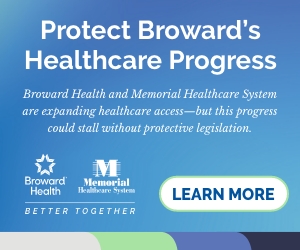Legislation designed to shield businesses from unscrupulous or opportunistic lawsuits related to the COVID-19 pandemic were filed today in both the Florida Senate and House of Representatives.
Florida House Speaker Chris Sprowls (R-Palm Harbor) said, “We are fast-tracking this COVID-19 liability protection bill to ensure that there is no potential for unscrupulous litigation to threaten Florida’s economic recovery. Ours is the most aggressive liability protection bill in the nation.
“Florida businesses and organizations that do the right thing should not fear being drowned by massive litigation costs,” Sprowls said.
House Bill (HB) 7, filed by Florida Representative Lawrence McClure, (R- Hillsborough County), offers general liability protection for Florida businesses, schools, nonprofits and religious institutions making a good-faith effort to follow established federal, state and local guidelines.
Senate Bill (SB) 72 is identical to the house bill and was filed by Senator Jeff Brandes (R-St. Petersburg), chair of the Senate Committee on Judiciary. The legislation provides protections for all persons, including businesses, charities, educational institutions, and others against a COVID-19-related claim. Specifically, the bill requires a court to dismiss without prejudice any lawsuit bringing a COVID-19-related claim if the complaint is not pled with particularity, or if the person filing the lawsuit failed to provide an affidavit of a physician attesting that the defendant caused the plaintiff’s injuries or damages. If the court determines that the defendant made a good faith effort to substantially comply with government issued health standards or guidance, the defendant is immune from liability.
Claims must be brought within one year after a cause of action accrues. The bills apply retroactively and takes effect upon becoming a law.
“A small-restaurant owner shouldn’t have to worry about making payroll because a predatory actor seized on an opportunity to sue and settle,” said McClure. “HB 7 does what 21 other states across the country have done already, and it does it better.”
The Civil Justice and Property Rights Subcommittee will take up HB 7 for a vote on the first day of the House’s first interim committee meeting week, January 13 at 4 p.m. in Webster Hall (212 Knott) at the Florida Capitol.
While HB 7 focuses on businesses and nonprofits, the Florida House will separately address COVID liability protections for health care providers and facilities, including nursing homes and long-term care facilities, in the Health and Human Services Committee.
“Florida’s health care providers have other considerations and risks that deserve greater discussion and evaluation,” said Sprowls. “We owe it to them and the vulnerable populations they serve to be heard before we address their concerns with another bill.
“The unprecedented nature of the COVID-19 pandemic has created an uncertain legal climate for Florida businesses, which could result in serious and ongoing economic challenges for our entire state,” said Brandes. “These important protections will aid in separating the serious and meritorious claims brought against a Florida business from the claims that are unfair or inappropriate as our state continues to fully reopen and recover.”
Florida Chamber of Commerce President and CEO Mark Wilson said this legislation is vital to the recovery of Florida’s economy.
“Florida has the fifth-worst legal climate in America and the last thing we need are a tsunami of frivolous COVID lawsuits as we seek to relaunch Florida’s economy. It’s important to provide Florida businesses, who are doing the right thing by their customers and employees, the assurance that they can continue doing their part to relaunch Florida’s economy without fear of facing frivolous lawsuits,” Wilson said. “It is encouraging these bills are being considered at the first opportunity in the 2021 Session. We look forward to working with Sen. Brandes, Rep. McClure and legislative leadership to ensure these bills move through the process and ultimately to the Governor’s desk in the strongest form possible.”
These bills will most likely face strong opposition from personal injury and trial lawyers. Paul Jess, executive director of the Florida Justice Association, which represents trial lawyers in Florida said in a Herald Tribune article about the issues, “From a public policy point of view, if I’m a business now and there’s no immunity from COVID liability, I’m encouraged to do things properly and safely, to keep people from thinking of suing me,” Jess said, “but if a law passed that gave me total immunity, what is my motivation for protecting the public?”
He added. “As a business owner, I’d say. ‘Come on in, we don’t require masks, we don’t have social distancing. We don’t care. You can’t sue us, we’re got total immunity.’
Recognizing this argument, Senator Danny Burgess (R-Zephyrhills), chair of the Senate’s Select Committee on Pandemic Preparedness and Response, said, “Floridians should have the expectation of safety when they enter a business. At the same time business owners and their employees must be allowed to earn a living and support their families amid changing guidance and regulations. As we continue to navigate the ongoing pandemic, this legislation will help protect businesses who are trying to do the right thing from the threat of potentially limitless civil liability.”
“Businesses across Florida have suffered greatly over the last several months and are doing the best they can to safely reopen during a period of extreme uncertainty,” said Senate President Wilton Simpson, (R-Trilby). “When a business makes a good faith effort to adhere to safety guidelines, our laws should provide strong protections.
“Speaker Sprowls and our House colleagues have been tremendous partners in crafting the important protections for our businesses contained in this legislation. As we move forward, we are continuing to work together on additional legislation to ensure protections for the health care providers who have been on the front lines of this pandemic from day one,” continued Simpson.




